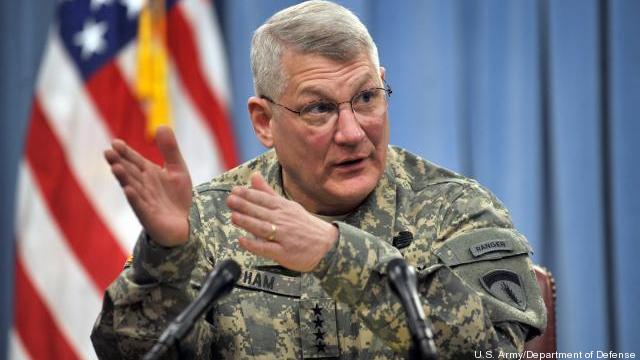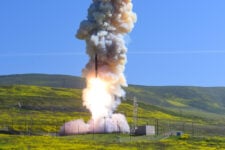 Washington: The American battle plan executed in Libya will not be the blueprint for how the U.S. military wages war in the future, the Army general who was in charge of that effort said today.
Washington: The American battle plan executed in Libya will not be the blueprint for how the U.S. military wages war in the future, the Army general who was in charge of that effort said today.
There were key lessons that U.S. forces did pick up during the Libyan mission that DoD can use in future conflicts, particularly in coordinating with non-NATO militaries and fighting as a coalition force, according to Africa Command chief Gen. Carter Ham.
But the exclusive use of sea and air power to support a small Libyan force — in this case anti-government rebels fighting against troops loyal to Col. Muammar Qaddafi — with no American boots on the ground won’t be the new normal for U.S. soldiers in combat, Ham said.
“It would be wrong” to assume that every future conflict the U.S. could be involved in would follow the Libyan template, Ham told reporters today.
As head of Africa Command, Ham had a direct hand in planning and coordinating U.S. missions in support of the Libyan operation.
U.S. action to enforce the United Nations peacekeeping mandate in the North African country earlier this year was not an indication that Africa Command was “going offensive” with its operations in country, Ham added.
Given the quick and violent way U.S. forces smashed through the Qaddafi’s defenses and command centers, with little to no American casualties, some suggested the Libyan operation was a window into how the U.S. could fight future wars.
Also, with manpower levels set to shrink over the next few years, as a result of budget pressures, those same advocates suggested it could be a more efficient way to wage war as well.
With the wars in Iraq and Afghanistan winding down, operations like Libya show “there is little role for a large standing army in supporting the national security of the United States once we have pulled out of our manpower-intensive counterinsurgency fights,” according to Chris Rawley, a senior operations planner for Special Operations Command.
But Ham was clear that every conflict was different, and there was not a one-size-fits-all plan that could be applied in Libya and elsewhere and produce the same types of results.
Trying to extrapolate an full-blown combat strategy based on the results of one operation is assuming a lot, Ham suggested, and those kinds of assumptions can be dangerous when made on the battlefield.
Move over FARA: General Atomics pitching new Gray Eagle version for armed scout mission
General Atomics will also showcase its Mojave demonstrator for the first time during the Army Aviation Association of America conference in Denver, a company spokesman said.


























